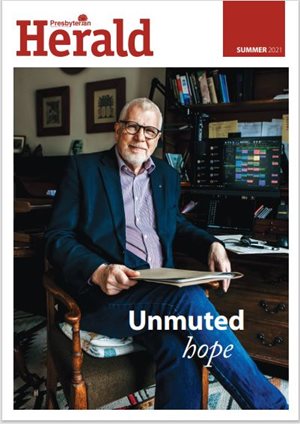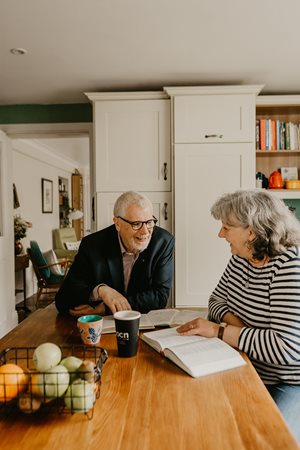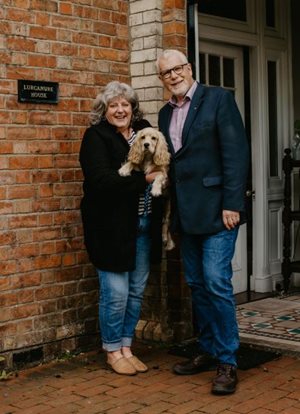In a reflective interview entitled 'Listening out for his master's voice', Dr Bruce looks back on his first year in office (not many Moderator’s get to reflect on their first year, while looking forward to their second), which has been an extraordinary year with a myriad of challenges. In it Will asks about Dr Bruce’s engagement with the media on various topics and meeting with political leaders, the effect of the pandemic on pastoral ministry and how the Church has been, and is being changed by it, if not reconfigured.
The interview, covers five pages of the 70-page summer edition, and you can read the full feature below. This edition also includes ‘Letters’ on issues from Bible reading and racism in Ireland, to ethical funds, ‘News in the round’, ‘As I see it’, ‘My Story’, ‘Life Lessons’ and news from the home and overseas mission fields in the ‘Mission Connect’ supplement - including prayer points.
These regular features are accompanied in this edition by articles on helping parents build emotional resilience in their children, post pandemic and a podcast produced by a local church helping parents disciple their children is also featured. There is also an update on how money raised by the Moderator’s Christmas Appeal has been used.
Looking ahead to COP26, the United Nations climate change conference, the convenor of PCI’s Stewardship of Creation Committee looks at how we can engage more effectively on this issue. There is also a report on how churches can support families affected by suicide and an article which asks ‘Has culture been cancelled? How ‘free’ is free speech?’
The summer edition is available to view free of charge as a PDF copy here. It is also as a digital copy which can be accessed at issuu.com.
Listening out for his master’s voice
Do you pray for our Moderator? If Dr David Bruce and his wife Zoë have met you on their official travels, virtual or in person, you can be sure that they pray for you. First thing in the morning, after breakfast, and after reading a psalm together. It is a commitment they have made, and they admit their list of names quickly became more of a booklet.
For the first time since 1894 the Church has announced that the current Moderator has been nominated to serve for a second term of office.
 David Bruce has been noticed by others during his first year as Moderator. Journalists and commentators, politicians and businessmen have remarked how he listens and understands, how he is willing to engage with people and find a point where they can connect.
David Bruce has been noticed by others during his first year as Moderator. Journalists and commentators, politicians and businessmen have remarked how he listens and understands, how he is willing to engage with people and find a point where they can connect.
Interviewers will take him on, and have done so. He is happy with that because he knows that it’s rarely personal, it is just their job. They have noticed that he is gracious, but no pushover, and that he will not be stepping down in June.
In the course of my conversations with our Moderator in the past 12 months, I have come to understand that this happens because of a deliberate and considered approach to the job.
A year ago, armed with notebook and digital recorder, I sat down with David in an office in Church House to interview him about his coming year as Moderator. That I am interviewing him again, a year later, and this time by Zoom, says a great deal about how our lives have changed, not least by the pandemic.
“Moderators will always tell you that they don’t want the job, but they’re willing to do it,” he smiles into his webcam, before he goes on.
“I used to think that was a bit of a cliché, but having lived a year of it, I can say that it’s very much the case.”
David thinks of the issue very simply. These are not easy times. His role is Secretary to the Presbyterian Church in Ireland’s Council for Mission in Ireland. In his view, to ask a parish minister to set aside his or her duties in such a year would be a very big ask.
“So maybe the Church had a wee bit of wisdom in seeing if I would be willing to do it,” he says.
A year ago, I wrote that in conversation, David Bruce quietly makes you listen and think. He still does. But with a year to look back on, no observer can fail to notice how much David thinks, and has thought about his job, and how the Presbyterian Church in Ireland interacts with our society, our country, and our island. It takes discipline, wisdom, humility, and hard graft. It’s no job for anyone depending simply on their own strength.
David has been noticed by others during his first year as Moderator...how he is willing to engage with people...
When we speak, it’s a matter of days after a week of rioting and violence on our streets. The news, and the mood in Northern Ireland has been bleak. I ask David about it, and he accepts that violence changes the conversation when he meets people.
He explains that in the previous few days he has met many people, including the Secretary of State, Brandon Lewis MP; the Chief Constable, Simon Byrne; the Taoiseach, Micheál Martin; the Shadow Secretary of State, Louise Haigh; and the Independent Reporting Commission (IRC).
The perspective of a Christian leader can change a narrative
He describes how it becomes almost impossible to have nourishing conversations across the divide and create the space where we can differ well. “We can differ badly when there’s violence,” he reflects ruefully.
Yet the perspective of a Christian leader can change a narrative, if they can just, with God’s help, find a way to engage, in a tense situation.
 “Hearing the Chief Constable give his take on the Bobby Storey funeral is quite a different narrative than a loyalist community leader on the Shankill Road the night after the Lanark Way violence,” says David. “I had both of those experiences”.
“Hearing the Chief Constable give his take on the Bobby Storey funeral is quite a different narrative than a loyalist community leader on the Shankill Road the night after the Lanark Way violence,” says David. “I had both of those experiences”.
He knows that any leader must resist the temptation of borrowing one narrative and hijacking it for their own. But he also knows how Presbyterians are likely to think about his job.
“They expect their Moderator to have an opinion,” he says.
He knows he is not called to be a political commentator, or a politician, or a journalist. “I’m none of those things – I’m a theologian and a pastor, that’s the USP (unique selling point) and, if I can bring that to the table, I will.”
I ask him how a minister learns to conduct meetings at this level, and he explains that he is helped by wise friends, by the experience of former Moderators, and by God’s guidance.
“I always will try and offer to pray with these folk at the end of the meeting,” he says unexpectedly.
At the speed of the internet and through a very ordinary webcam, he sees my eyebrows shoot up – and he smiles back at me from my computer screen.
“Knowing that that is coming moderates greatly what I say,” he explains.
“Has anyone ever said no to the offer of prayer?” I ask.
No. Sometimes it isn’t appropriate to offer, but whenever he has, no one has ever said no.
“I often will find myself saying, ‘You know, the Christian gospel allows us to think optimistically about the future.’”
Before Covid-19 changed everything, I had asked David at length about how society views the church, and how important it can be to explain why our views are not always the prevailing ones.
I always will try and offer to pray...at the end of the meeting...Knowing that that is coming moderaters greatly what I say.
He has become known as a Moderator who speaks out boldly and graciously, not least when a subject like so-called gay conversion therapy is in the news, and being debated in the Stormont Assembly.
He explains that the best approach is to think tactically and about the issue itself. The tactics in this case were to be aware, to know that such a debate was coming, and take time to think and pray about it. In this case, an article by David appeared in the Newsletter on the morning of the debate.
“Now if people want to refer to it, or review it, or look out, or quote it they can then do that,” he says.
On the matter of the issue itself, a Moderator can easily be very exposed, particularly where the General Assembly has never debated the matter and there is no accepted position.
 “You use your sanctified common sense, you talk with colleagues and you seek to discern what looks and feels like Presbyterianism in relation to this,” David explains.
“You use your sanctified common sense, you talk with colleagues and you seek to discern what looks and feels like Presbyterianism in relation to this,” David explains.
“You kind of get a sense of what sounds like us as you go on and that’s a really valuable thing you acquire, I don’t think you can learn it, you imbibe it.”
I am struck by the effort our Moderator is required to put in to understand the issues facing our Church. How he researches, reads and listens, rings up the experts and asks for a briefing on everything from street violence, to the Northern Ireland Protocol.
Although David is active as ‘PCI Moderator’ on social media sites, such as Twitter, he makes a point of never debating or arguing in those contexts. He prefers to live with the fact that you are sometimes misrepresented, and can make things worse by correcting or rebuking others in public.
David thinks that the Presbyterian Church in Ireland is being reconfigured from within...
“You don’t lose any sleep over it, you let it go,” he says.
“You can only let a thing go and be misrepresented if you’re at peace in your heart, so I know what I’ve done before God and before my wife and before the General Assembly and before whomever else.”
We pause for a moment in our conversation as the evening sunlight slants into our different rooms in different cities. I am struck by the very obvious fact that we are in different rooms, miles apart.
I ask him about his view that Christians have been ‘unpastored by Covid-19’.
He explains that we have been prevented from doing the things that pastors do most intuitively, which is to be with people. David thinks we have been building up a reserve of pastoral needs, which have been unmet.
“I’m certainly getting that narrative from ministers on the ground who are saying they know that,” he adds. But he also tells me that has to be qualified a little because people have been very innovative in the way that they’ve gone about this.
He tells me the story of a young minister who arrived in his first charge just as lockdown began a year ago. He got out an ordinance survey map and he drew three circles covering a mile radius from the manse, a two-mile radius, and the rest of the district. The first circle he walked, the second he cycled, the third he drove. He phoned ahead, telling people when he’d be at their gate or door, if they wanted to come out and talk.
“Within three months he’d been at least at the front gate of every home within his parish,” smiles David. “That’s a set of pastoral relationships and a demonstration of commitment which will bear fruit in his ministry for years to come.”
That is just one story among many, of people who have been selfless in their approach to being safe but innovative, being pastoral but careful. Churches are planning and innovating in the time God has given us to be scattered, but gathered.
...it is time to reimagine how we are percieved from the outside, looking in, rather than from the inside, looking out.
David thinks that the Presbyterian Church in Ireland is being reconfigured from within, by those who sincerely wish to follow Christ. He believes it is time to reimagine how we are perceived from the outside, looking in, rather than from the inside, looking out.
He explains that 540 congregations, and 540 kirk sessions in Ireland are seeing that God takes the long view.
“So should we. That nothing is wasted, but what currently seems awful, may in retrospect turn out to be providentially wise.
“We see what we see, we see the disruption in front of us, we make sense of it, and then walk by faith.”
Images (1) The front cover of the summer edition of the Presbyterian Herald showing Dr Bruce in his study (2) at the kitchen table with wife Zoë and (3) outside their home in Lisburn with their eight month old cockapoo pup, Lucca.